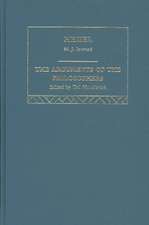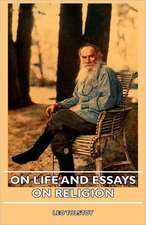On Life and Essays on Religion: The Ghost Dance, the Prairie Sioux - A Miscellany
Autor Leo Tolstoyen Limba Engleză Hardback – 3 noi 2008
Preț: 301.41 lei
Nou
Puncte Express: 452
Preț estimativ în valută:
57.68€ • 60.34$ • 47.91£
57.68€ • 60.34$ • 47.91£
Carte tipărită la comandă
Livrare economică 03-17 aprilie
Preluare comenzi: 021 569.72.76
Specificații
ISBN-13: 9781443726498
ISBN-10: 1443726494
Pagini: 452
Dimensiuni: 140 x 216 x 29 mm
Greutate: 0.72 kg
Editura: Marcel Press
ISBN-10: 1443726494
Pagini: 452
Dimensiuni: 140 x 216 x 29 mm
Greutate: 0.72 kg
Editura: Marcel Press
Notă biografică
Leo Tolstoy was a Russian writer who is regarded as one of the greatest authors of all time. He received nominations for the Nobel Prize in Literature every year from 1902 to 1906 and for the
Nobel Peace Prize in 1901, 1902 and 1909 but never won either. Critics of diverse schools have agreed that somehow Tolstoy's works seem to elude all artifice. His name has become synonymous with an appreciation of contingency and of the value of everyday activity. Oscillating between scepticism and dogmatism, Tolstoy explored the most-diverse approaches to human experience.











